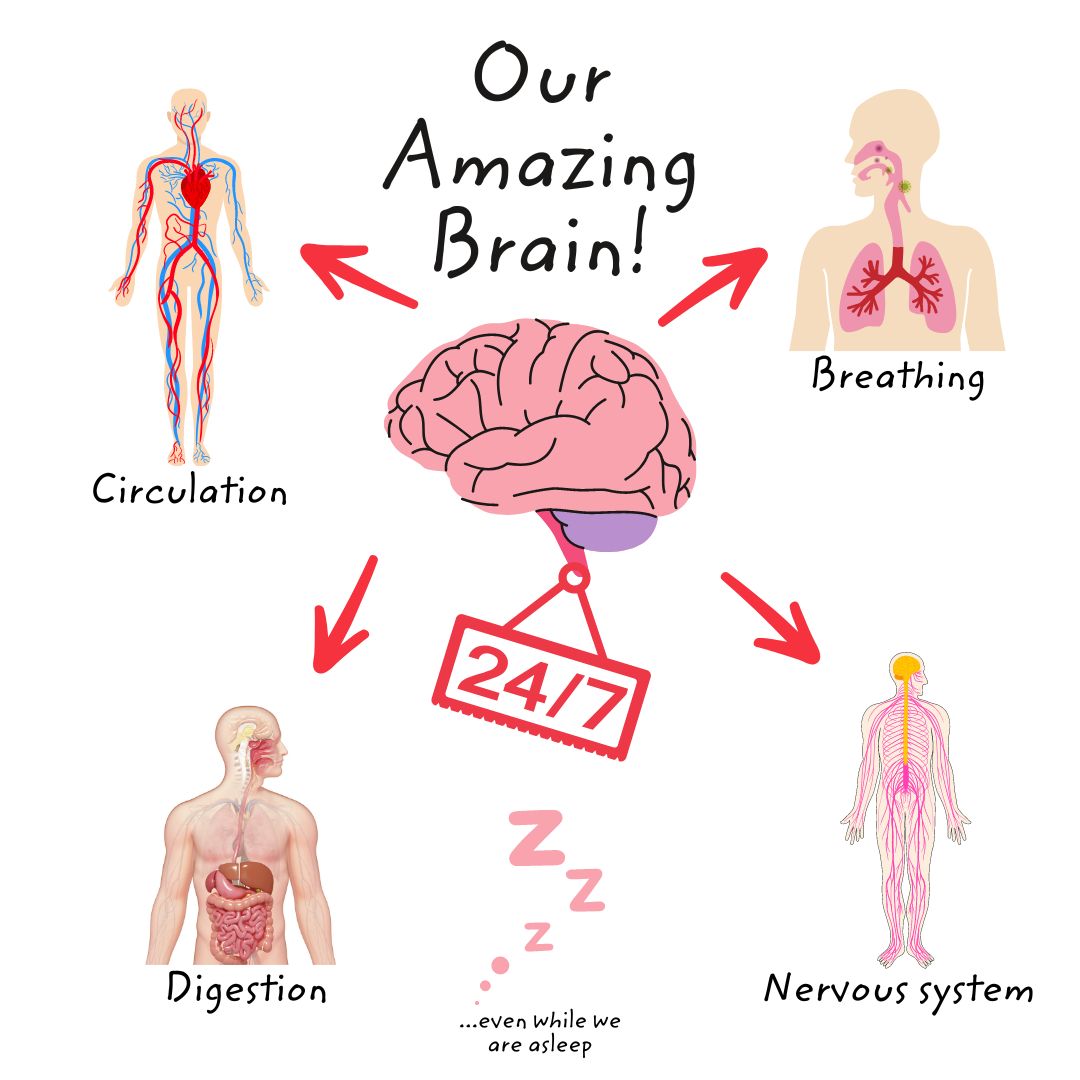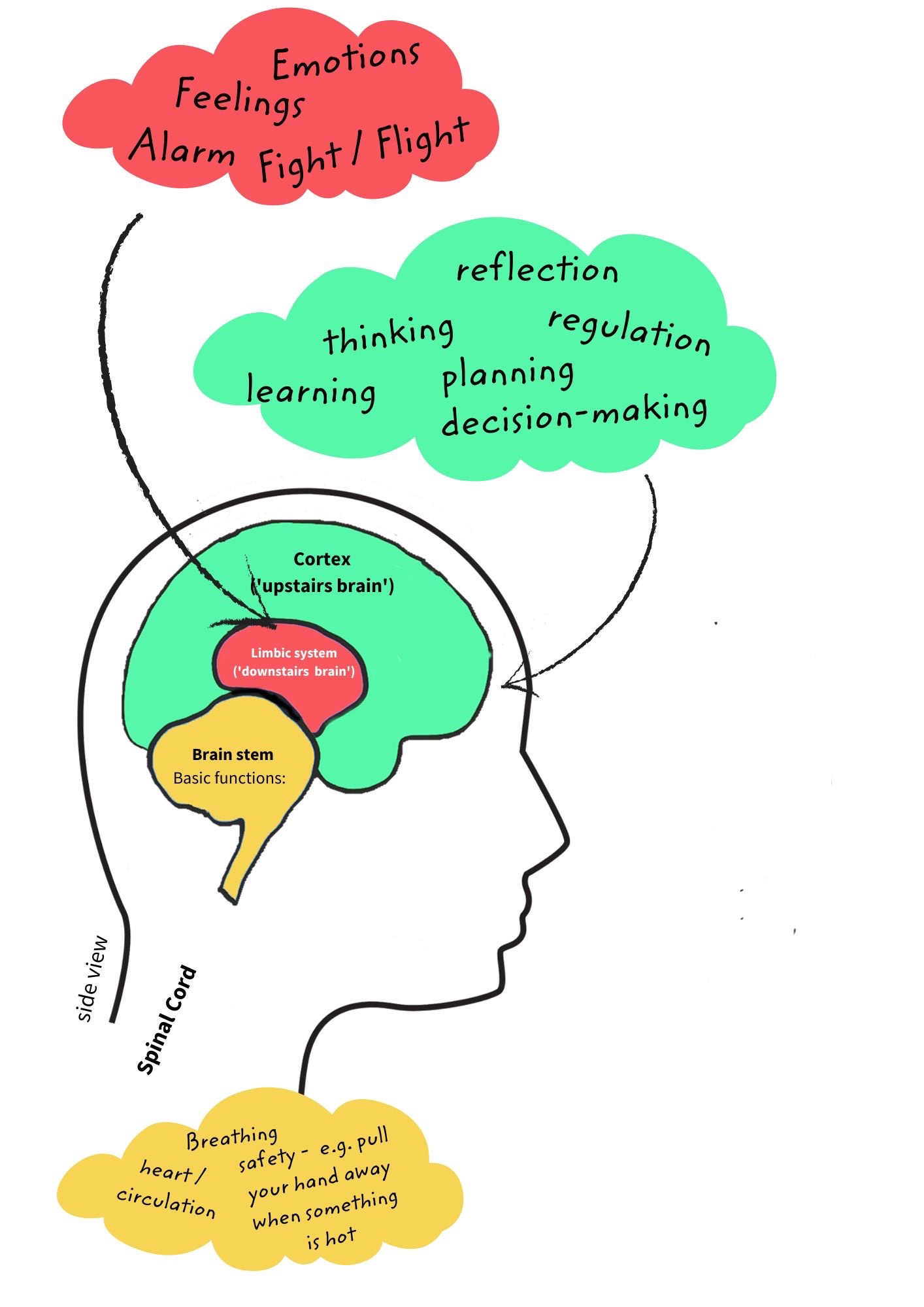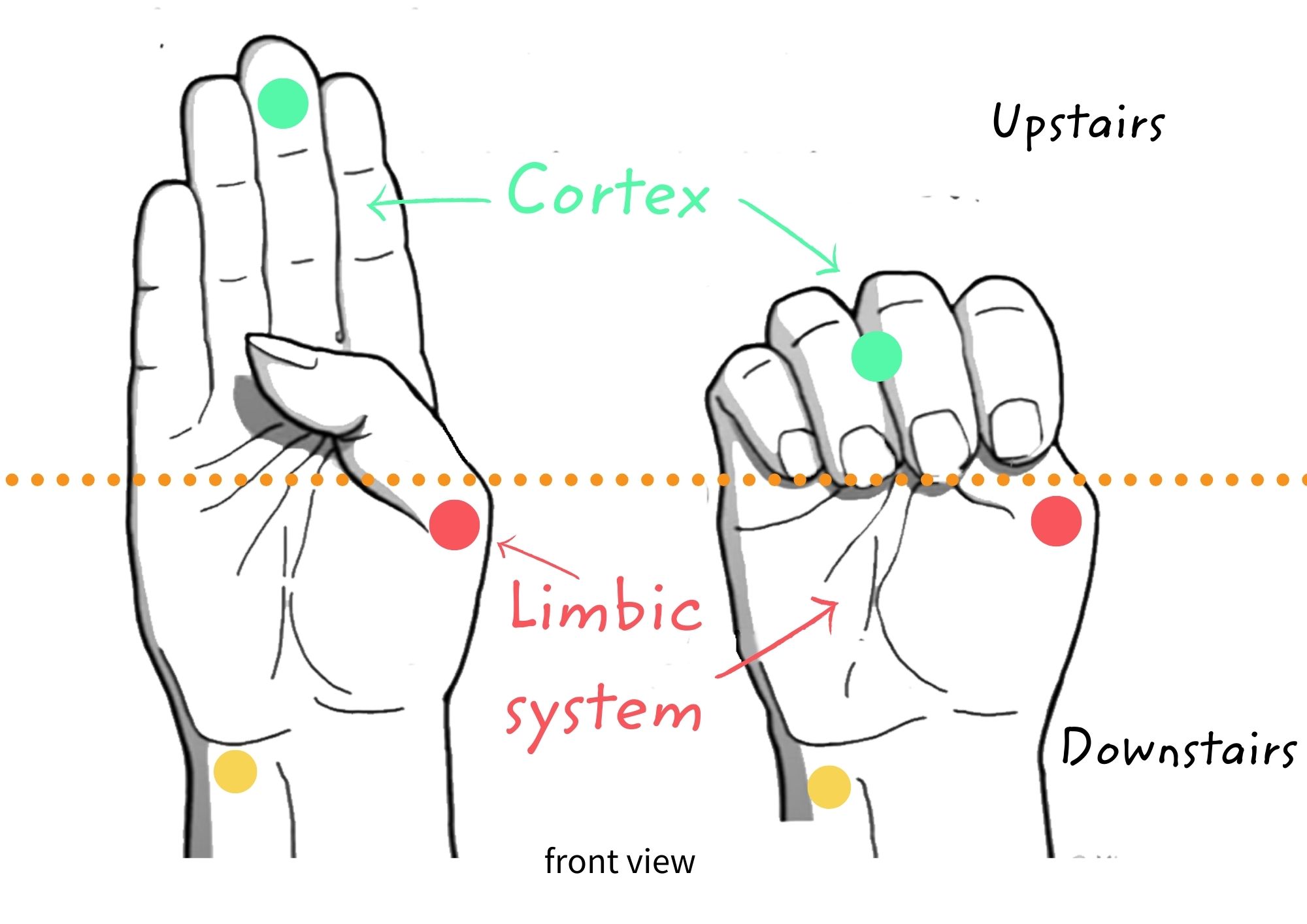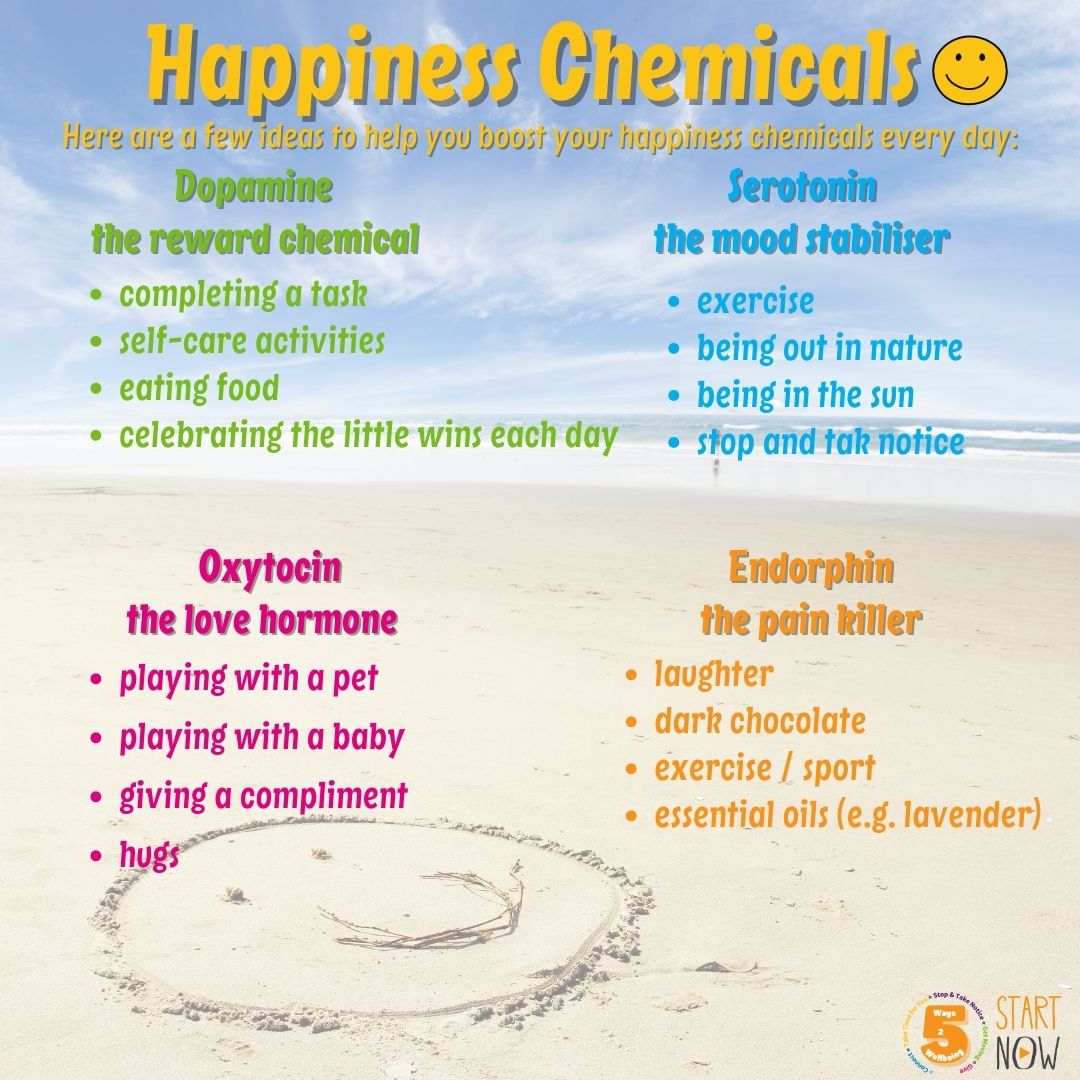It’s all about the brain science
Why all the feelings and emotions? Why can they be trickier now when you are growing in adulthood?
Our brains are amazing.
At the moment your brain is doing things like keeping your heart beating or making sure you're breathing. All without you being aware...
...until someone mentions it!
The brain controls our circulation and our breathing and all the other things happening in bodies. Every day, whatever we're doing and even when we sleep...

Now we’ve drawn your attention to it - why not stop a moment and...
- Think about your heart beating (find your pulse & feel your heart beating).
- Now focus on your breathing.
- Breathe slowly, feel the air enter your body.
- Hold your breath for a moment and imagine the oxygen being carried round your body from scalp to the soles of your feel – wow!
- Hold for a moment more and;
- Breathe out slowly
That was a super easy way to get grounded and calm yourself. There are lots more great breathing and grounding ideas in the wellbeing toolbox.
Anyway back to the amazing brain…
As well as all the breathing and the other stuff keeping our bodies going. The brain is where our all our learning and decision making takes place, and where our emotions and feelings are controlled.
Understanding a bit about the brain
Unless you’re planning a career in neuroscience this simple model is a good way to understand what's happening inside our brains.
'Upstairs / Downstairs' / Hand Model of the Brain

Think of your brain in two parts; the upstairs brain and the downstairs brain:
The upstairs brain (cortex) is the 'smart part' - thinking, planning, learning, decision-making, regulation and reflection.
The downstairs brain (limbic system and brain stem) the emotional part - feelings, and our alarm system which is meant to keep us safe from danger (like sabre-toothed tigers) by getting us ready to fight or run away.

Most of the time the upstairs and downstairs parts work well together with our 'smart part' keeping a lid on emotional stuff. Sometimes when we experience strong emotions or the alarm system goes off... we can flip our lids. The downstairs brain takes over and thinking / logic go offline and it's 'react, react, react'.

Hold up your hand. Tuck your thumb (representing the downstairs brain) into your palm. Now wrap your fingers (representing the upstairs brain) over your thumb. This is a model of a brain working in harmony. The upstairs and downstairs are connected and communicating.
When big emotions come along the downstairs brain takes over and you 'flip your lid' (fingers up) and the connection is broken. It can be hard to 'control'. Have a look at the you tube videos at the end of this page - for more about flipping your lid!
Sometimes the downstairs brain sets off a false alarm. No real danger (like a Sabre-toothed tiger) but that makes the brain feel under attack. Sometimes things can seem small: like being asked to tidy your room, speak in public or being told off by a teacher!
'Name it to tame it'
Everyone flips their lids. The good news is we can learn to "name it to tame it" - by recognsing feelings and emotions and by understanding what's happening when we flip our lid and develop ways to help the 'upstairs brain' to get back in control. See the Wellbeing Toolkit for some ideas
Trauma and the brain
Some people have had a tough time growing up or have had really stressful experiences in their lives (sometimes called 'trauma'). This means that their alarm system can get 'stuck' in the 'on' position and they can 'flip their lid' more quickly. It's not their 'fault' - their experiences have made them feel unsafe a lot of the time and so they are more alert and looking for danger a lot of the time. For people it is often really helpful if they practice 'naming it and taming it' with another person like a trusted adult. This is called co-regulation.
You can find about a lot more about trauma and the brain in some really good books for young people:
- 'The Strange and Curious Guide to Trauma' by Sally Donovan
- Help! I've got an Alarm Bell Going Off in my Head! by K.L.Aspen
The Teenage Brain
You’ll not be surprised to hear adolescence can be a tricky time brain-wise. Your amazing brain is undergoing some pretty big changes:
- You’re making lots of new grey matter and new connections as your brain develops.
- At the same time there’s a bit of ‘pruning’ going on where old and unimportant stuff you don’t need any more is being cut away.
This is why teenagers need so much sleep as a lot of the work on the brain happens when you’re sleeping.
The different parts of the brain develop at different rates, e.g. the limbic system (where the emotional processing takes place) develops faster than the cortex, the logic and decision-making centre.
This means adolescents can be more reactive; emotional rather than being rational (‘flipping your lid’). Behaviour can be inconsistent and more risky.
BUT it’s not all bad news… as the brain develops at this time there is tremendous potential for learning and enjoying new experiences.
Your brain needs your help as it develops:
- Lots of sleep
- Exercise
- A healthy diet
- Relaxation
The 5 Ways to Wellbeing are a good guide to looking after yourself.
Brain Chemicals
Emotions are controlled by different levels of chemicals in the brain. Click on the buttons below to learn about the ones you need to know.
The happiness chemicals are:
- Serotonin – helps stabilise mood and is responsible for our feeling of wellbeing and happiness
- Dopamine – is released when we reach a goal or complete a task
- Oxytocin – is stimulated by trust and touch. It forms when we are around other people and socialising.
- Endorphins – are released to reduce stress and relieve pain. They can produce a feeling of euphoria – have you heard of the ‘endorphin high’ that comes from physical exercise?
There are things you can to boost your happiness chemicals every day:

Cortisol - As your body perceives stress, it sets off the alarm system and your body makes and releases the hormone cortisol into your bloodstream. Often called the “stress hormone,” cortisol causes an increase in your heart rate and blood pressure. It's your natural “flight or fight” response that has kept humans alive for thousands of years. Cortisol is increased if you don't get enough sleep. Less sleep = more stress.
Learn more about the brain by watching the videos below.